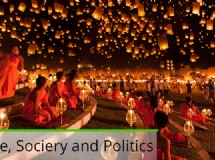Why, Sir, you find no man, at all intellectual, who is willing to leave London. No, Sir, when a man is tired of London, he is tired of life; for there is in London all that life can afford.
(Samuel Johnson, quoted by James Boswell in The Life of Samuel Johnson, LL.D., 1791)
These days, unfortunately, not many of us can afford to live in London. But we can always experience the city vicariously--by reading 13 evocative essays about London published over the past 300 years.
Enjoy these brief excerpts from our collection of Classic British and American Essays and Speeches and then follow the links to the original essays.
- "The Cries of London" by Joseph Addison (1711)
There is nothing which more astonishes a foreigner, and frights a country squire, than the cries of London. My good friend Sir Roger often declares, that he cannot get them out of his head, or go to sleep for them, the first week that he is in town. - "A Ramble From Richmond to London" by Richard Steele (1712)
But before five in the afternoon I left the city, came to my common scene of Covent-garden, and passed the evening at Will's in attending the discourses of several sets of people, who relieved each other within my hearing on the subjects of cards, dice, love, learning, and politics. The last subject kept me till I heard the streets in the possession of the bellman, who had now the world to himself, and cried, Past two o'clock. - "London" by Charles Lamb (1802)
The very deformities of London, which give distaste to others, from habit do not displease me. The endless succession of shops, where Fancy (miscalled Folly) is supplied with perpetual new gauds and toys, excite in me no puritanical aversion. I gladly behold every appetite supplied with its proper food.
- "The Coffee Houses of London" by Thomas Macaulay (1848)
Foreigners remarked that the coffeehouse was that which especially distinguished London from all other cities; that the coffee-house was the Londoner's home, and that those who wished to find a gentleman commonly asked, not whether he lived in Fleet Street or Chancery Lane, but whether he frequented the Grecian or the Rainbow. Nobody was excluded from these places who laid down his penny at the bar. - "The Watercress Girl" by Henry Mayhew (1851)
"We children never play down there, 'cos we're thinking of our living. No; people never pities me in the street--excepting one gentleman, and he says, says he, 'What do you do out so soon in the morning?' but he gave me nothink--he only walked away." - "Night Walks" by Charles Dickens (1861)
But the river had an awful look, the buildings on the banks were muffled in black shrouds, and the reflected lights seemed to originate deep in the water, as if the spectres of suicides were holding them to show where they went down. The wild moon and clouds were as restless as an evil conscience in a tumbled bed, and the very shadow of the immensity of London seemed to lie oppressively upon the river. - "A Wet Night in London" by Richard Jefferies (1885)
Five hundred well-dressed and civilized savages, wet, cross, weary, all anxious to get in--eager for home and dinner; five hundred stiffened and cramped folk equally eager to get out--mix on a narrow platform, with a train running off one side, and a detached engine gliding gently after it. Push, wriggle, wind in and out, bumps from portmanteaus, and so at last out into the street. - "London" by Henry James (1888)
For a man of letters who endeavors to cultivate, however modestly, the medium of Shakespeare and Milton, of Hawthorne and Emerson, who cherishes the notion of what it has achieved and what it may even yet achieve, London must ever have a great illustrative and suggestive value, and indeed a kind of sanctity. - "Bits of London" by Ford Madox Ford (1905)
Above all his London, his intimate London, will be the little bits of it that witnessed the great moments, the poignant moods of his life; it will be what happened to be the backgrounds of his more intense emotions. Certain corners of streets, certain angles of buildings, the spray of dishevelled plane-trees, certain cloud-forms, gusts of white smoke, odours, familiar sounds--these, in their remembrance will wring his heart. - "The Aspect of London" by Arthur Symons (1909)
[F]or the most part the appeal of London is made by no beauty or effect in things themselves, but by the sense which it gives us of inevitable growth and impregnable strength, and by the atmosphere which makes and unmakes this vast and solid city every morning and every evening with a natural magic peculiar to it. - "Quality" by John Galsworthy (1912)
It was over a year before I was again in London. And the first shop I went to was my old friend's. I had left a man of sixty, I came back to one of seventy-five, pinched and worn and tremulous, who genuinely, this time, did not at first know me. - "Nights in London" by Thomas Burke (1915)
London was never made: she has "growed." Paris affords no townscapes: everything there is too perfectly arranged; its artificiality is at once apparent. In London alone he finds those fantastic groupings, those monstrous masses of light and shade and substance. - "Street Haunting: A London Adventure" by Virginia Woolf (1927)
It becomes instantly between two and three in the morning; the lamps are burning very white in the deserted streets of Mayfair. Only motor-cars are abroad at this hour, and one has a sense of emptiness, of airiness, of secluded gaiety.
SHARE






































